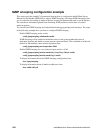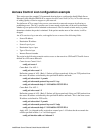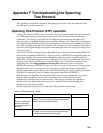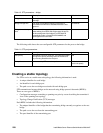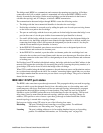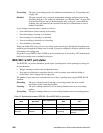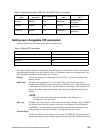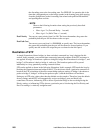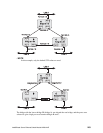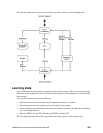
258 Intel® Blade Server Ethernet Switch Module IXM5414E
The following table shows the user-configurable STP parameters for the ports on the bridge.
Creating a stable topology
For STP to arrive at a stable network topology, the following information is used:
• A unique identifier for each bridge
• An identifier for each bridge port
• The path cost to the root bridge associated with each bridge port
STP communicates between bridges on the network using bridge protocol data units (BPDUs).
There are two types of BPDUs:
• Configuration messages containing a spanning tree priority vector describing the transmitter’s
view of the spanning tree topology
• Topology Change Notification (TCN) messages
Each BPDU includes the following information:
• The unique identifier of the bridge that the transmitting bridge currently recognizes as the root
bridge
• The path cost to the root from the transmitting port
• The port identifier of the transmitting port
Bridge hello time The length of time between broadcasts of the hello
message.
2 seconds
Bridge maxage time The length of time before topology information or
information from BPDUs is discarded because it has
aged out.
20 seconds
Bridge forward delay
time
The amount of time spent by a port in the discarding
states waiting for a BPDU that might return the port to
the discarding state if the bridge is in IEEE 802.1D
compatibility mode or if operPointToPointMAC and
operEdgePort are both False.
15 seconds
Table 11. STP port parameters
Variable Description Default value
Port priority The relative priority for each port. The lower the number
the higher the priority and the greater the likelihood of
the port being elected as the root port.
128
Port path cost A value used by STP to evaluate paths. auto (calculated based
on the link speed)
Table 10. STP parameters – bridge
Parameter Description Default value







